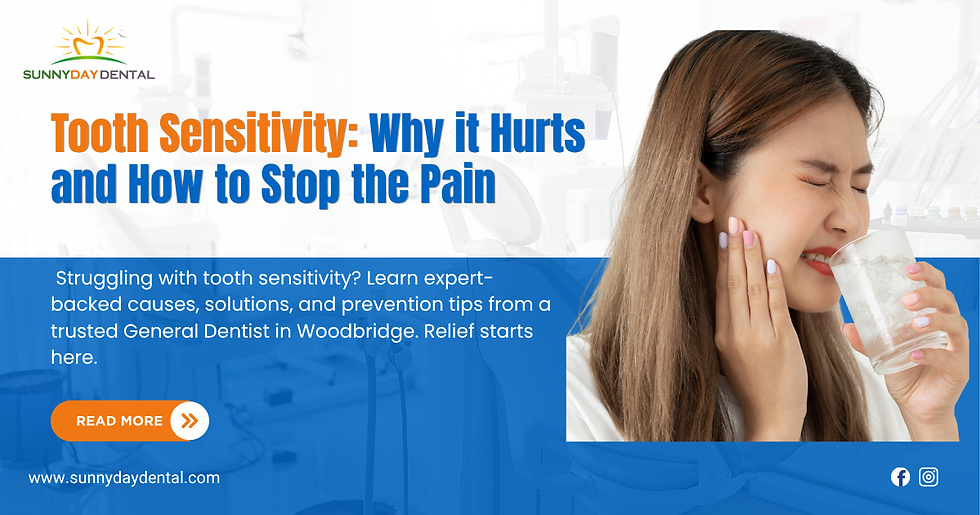How to Keep Your Teeth Clean
- Sunny Day Dental
- Mar 24
- 4 min read

Maintaining clean and healthy teeth is essential for overall oral health. Poor oral hygiene can lead to cavities, gum disease, and even systemic health issues. With proper daily care and professional guidance, you can ensure a bright and healthy smile for years to come. In this guide, we’ll explore the best practices to keep your teeth clean, backed by expert advice and the latest research from 2024. Regular Teeth Cleanings in Woodbridge play a crucial role in maintaining optimal oral hygiene, preventing plaque buildup, and reducing the risk of gum disease.
Why Is It Important to Keep Your Teeth Clean?
Clean teeth don’t just mean a bright smile—they are crucial for overall health. Poor oral hygiene has been linked to heart disease, diabetes, and respiratory infections. Neglecting oral care can also lead to plaque buildup, bad breath, gum disease, and tooth loss. By prioritizing teeth clean habits, you not only improve oral health but also protect your overall well-being.
Daily Habits to Keep Your Teeth Clean
1. Brushing Twice a Day the Right Way
Brushing properly is the foundation of oral hygiene. Follow these best practices:
Use a soft-bristled toothbrush and fluoride toothpaste.
Brush for at least two minutes, covering all surfaces of the teeth.
Hold the brush at a 45-degree angle to the gums and use gentle, circular motions.
Replace your toothbrush every three months or sooner if the bristles are frayed.
2. Floss Daily to Remove Hidden Debris
Flossing is just as important as brushing. It helps remove food particles and plaque from areas a toothbrush can’t reach.
Use about 18 inches of floss and wrap it around your fingers.
Glide it gently between your teeth, curving it into a ‘C’ shape against each tooth.
Avoid snapping the floss, as it can harm your gums.
3. Use an Antimicrobial Mouthwash
A fluoride or antimicrobial mouthwash can help keep bacteria at bay and strengthen enamel.
Choose alcohol-free mouthwash to prevent dryness.
Swish for 30–60 seconds after brushing and flossing.
4. Stay Hydrated
Drinking plenty of water helps wash away food particles and bacteria, preventing plaque buildup. Saliva plays a crucial role in neutralizing acids and keeping the mouth clean.
5. Eat a Teeth-Friendly Diet
Certain foods contribute to teeth clean habits:
Crunchy fruits and vegetables like apples and carrots help scrub plaque.
Dairy products provide calcium for stronger teeth.
Nuts and seeds contain minerals that protect enamel.
Avoid sugary snacks and acidic beverages that erode enamel.
Professional Care for Long-Term Oral Health
1. Regular Teeth Cleanings in Woodbridge
Professional cleanings remove stubborn plaque and tartar that brushing alone cannot eliminate.
Schedule dental cleanings every six months.
Professional cleanings reduce the risk of cavities and gum disease.
Ask your dentist about deep cleaning if you have excessive plaque buildup.
2. Visit a General Dentistry in Woodbridge Clinic
Routine checkups with a general dentist ensure early detection of potential problems.
Dentists can spot early signs of cavities, gum disease, or oral cancer.
Preventive care can save you from expensive dental treatments in the future.
Your dentist may recommend fluoride treatments or sealants for added protection.
Choosing General Dentistry In Woodbridge ensures access to expert dental care tailored to your oral health needs.
Best Practices to Maintain a Healthy Smile
1. Use the Right Oral Care Products
Choose fluoride toothpaste to strengthen enamel.
Use an electric toothbrush for more effective plaque removal.
Consider a water flosser if traditional flossing is difficult.
2. Replace Sugary Drinks with Healthier Alternatives
Switch sodas and juices for water, herbal teas, or milk.
If you consume acidic drinks, use a straw to minimize contact with teeth.
3. Avoid Smoking and Alcohol
Smoking stains teeth and increases the risk of gum disease and oral cancer.
Excessive alcohol consumption can dry out the mouth and promote bacterial growth.
4. Protect Your Teeth from Grinding (Bruxism)
If you grind your teeth at night, consider using a mouthguard.
Stress management and relaxation exercises can help reduce grinding.
Best Quick Tips for Clean Teeth
Want to keep your teeth sparkling clean? Follow these quick expert tips:
Brush twice daily with fluoride toothpaste.
Floss every night before bed.
Rinse with an alcohol-free mouthwash.
Drink plenty of water throughout the day.
Schedule regular teeth clean appointments with your dentist.
Keeping your teeth clean is more than just about appearances—it’s about overall health. By following these expert recommendations, you can maintain strong, healthy teeth for a lifetime. However, professional dental care is essential for long-term oral hygiene.
If you're looking for Teeth Cleanings in Woodbridge or need comprehensive dental care, visit Sunny Day Dental. Our experienced team offers high-quality preventive and restorative dental services tailored to your needs
FAQs
1. How often should I replace my toothbrush?
You should replace your toothbrush every three months or sooner if the bristles are frayed. A worn-out toothbrush is less effective at removing plaque.
2. Is it better to use an electric toothbrush or a manual one?
Both can be effective, but electric toothbrushes are generally better at removing plaque and preventing gum disease. They are especially beneficial for people with limited mobility.
3. Can diet affect how clean my teeth stay?
Yes! A diet high in sugar and acidic foods can contribute to plaque buildup and cavities, while fibrous fruits and dairy help strengthen enamel and clean teeth naturally.
4. Why do my gums bleed when I floss?
Bleeding gums are often a sign of inflammation due to plaque buildup. Regular flossing and good oral hygiene can help reduce bleeding over time.
5. How soon should children start visiting a dentist?
Children should have their first dental visit by their first birthday or when their first tooth appears. Early visits help establish good oral hygiene habits and detect any issues early on.




Comments